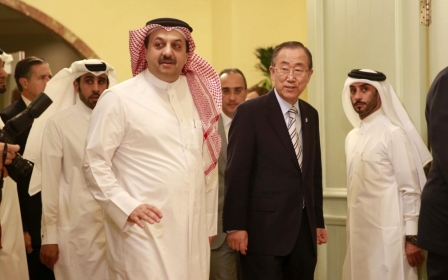Hope, despite Arab impotence over Palestine

There have been statements of support and pledges of financial aid to the people of Gaza from Arab leaders since Israel's onslaught began. The reaction on social media has been a resounding "not enough". Such cynicism is understandable, given the impotence - even duplicity - of Arab governments with regard to Israel, and the lip service paid to one of the greatest regional tragedies in modern history.
However, when I ask Arabs what they think their leaders can do - as opposed to what they would like them to do - they are often stuck for an answer. In general, the Arab world is weak - militarily, economically and politically - certainly in comparison to Israel and its allies (primarily the US).
The region is wracked by division within and between countries, so on a state level, options are limited to say the least. An effective response is only possible via a united front, but Arab leaders cannot agree on the weather, let alone common policy. This is exacerbated by Palestinians' own internal divisions, in which their Arab neighbours are taking sides. In my lifetime, I have never seen the region so fractured.
People ask: "Where are the Arab armies?" As if they would not be obliterated by Israel. Syria's Bashar al-Assad asked during his presidential inauguration: "Why don't [Arab countries] send their combat soldiers" to Gaza? This from someone who has never responded militarily to a single Israeli provocation against Syria or the Palestinians in his 14 years in power.
What chance would any Arab army have against the strongest military in the region, stocked with nuclear weapons and backed by the world's superpower? The US is very clear about its aim to maintain its ally's qualitative edge over combined Arab armies. Even supplying weapons to Palestinian fighters would be extremely difficult given the tight blockade of Gaza by Israel and Egypt. So in a nutshell: a military option is off the table.
What economic ties Arab states have with Israel - openly or clandestinely - are nowhere near sufficient to provide leverage. The Arab League boycott crumbled long ago, and was never universally or effectively implemented anyway. Resurrecting it now, given regional divisions and Israel's peace treaties with neighbouring Egypt and Jordan, is wishful thinking and is not even being considered.
Similarly, Arab states have no economic leverage over Israel's allies. Many of the region's leaders are too dependent on the US to be willing to pressure it with regard to Israel. An oil embargo similar to 1973-74? Forget it.
OPEC is weaker that it was then, and an embargo today would be more easily circumvented by buying from major oil exporters that are not part of the cartel. The US itself, as the world's third-largest producer and 10th-largest exporter, is less dependent on Arab oil.
Furthermore, the economies of the wealthy Gulf states are too dependent on oil sales to risk such a strategy. The monarchs are mindful that prosperity has kept at bay public pressure for reforms. They would also not want to jeopardise American backing, particularly given regional turmoil and tensions with Iran.
The US considered invading Saudi Arabia, Kuwait and Abu Dhabi in response to the oil embargo - Arab leaders are mindful of America's propensity for regime change in the region to secure its interests.
Arab governments also have little political leverage. Much is made of diplomatic moves by non-Arab countries, such as recalling their ambassadors to Israel. However, besides Egypt and Jordan, Arab states do not have diplomatic ties to sever or downgrade, or deals to cancel. Even if there was the will to push the US to use its influence on Israel, what pressure could be applied that would convince an unflinchingly pro-Israel American polity to change its tune?
Of all the Arab states, public anger should be directed most towards Egypt. It is bad enough that regional leaders are either unable or unwilling to help the Palestinians. However, Egypt - once a champion of the cause - is actively partaking in the blockade of Gaza, stopping aid convoys, and directly contributing to the misery of its inhabitants. This is an inexcusable shame.
Without a united Arab stand, any individual action or decision, no matter how strong, would likely be more damaging to that particular country and its people than to Israel or its allies. Despite Arab governmental impotence, public solidarity with Palestine has always been strong.
This should not be jeopardised by giving an impression that the wellbeing of Palestinians should come above that of their Arab kin. Solidarity cannot be implemented at any price - this is counter-productive and will backfire. To be effective, it has to be expressed and harnessed practically.
Arabs are right to be angry, but their anger should be directed at the general Arab malaise, of which ineptitude and inaction over Palestine is a symptom. Arab leaders were no less ineffective when Israel invaded Lebanon in 2006, or when the US invaded and occupied Iraq. The list goes on.
For the foreseeable future, it seems futile to expect any more, or any better, from Arab governments. Better then to focus public energies on grassroots campaigns, for which there has been a groundswell of support amid the Gaza onslaught, including many people who were not previously involved or aware.
For example, the Boycott, Divestment and Sanctions movement against Israel has gone from strength to strength, without any state help or the endorsement of the Palestinian Authority. One can lobby for a wide range of issues, from media coverage to human rights and everything in between. Protest, meet your MP, write letters, tweet, boycott goods or stores - whatever and wherever you feel you can make a difference.
Today, there are far more organisations dedicated to various aspects of the Palestinian cause than existed just 15 years ago. Those that did exist then are now much larger. They can help guide activists and lobbyists, so people should not feel unable to contribute.
There is a tangible change in public opinion in countries whose governments have been traditionally sympathetic to Israel. That has come about through people power, not Arab leaders. That is cause for hope. Activists have done more for Palestine than Arab governments ever have. As has been shown throughout history, when governments cannot or will not, then the people must, and can.
- Sharif Nashashibi is an award-winning journalist and analyst on Arab affairs. He is a regular contributor to Al Arabiya News, Al Jazeera English, The National, and The Middle East magazine. In 2008, he received an award from the International Media Council "for both facilitating and producing consistently balanced reporting" on the Middle East.
The views expressed in this article belong to the author and do not necessarily reflect the editorial policy of Middle East Eye.
Photo credit: Red crescent members of United Arab Emirates (UAE) build a field hospital, to serve with 70 beds, in Deir Al-Balah, Gaza on July 18 (AA)
Stay informed with MEE's newsletters
Sign up to get the latest alerts, insights and analysis, starting with Turkey Unpacked
Middle East Eye delivers independent and unrivalled coverage and analysis of the Middle East, North Africa and beyond. To learn more about republishing this content and the associated fees, please fill out this form. More about MEE can be found here.





